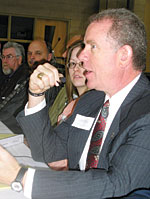
The tradition of the twice-yearly meeting of the panel is to interact with the students during the morning of their visit to the campus and conduct a business meeting in the afternoon. Students have the opportunity to meet one-on-one with panel members who are business leaders in the HVACR industry, including contractors, suppliers, and manufacturers.
FSU HVACR school chairman Mike Feutz started off the questions for panel members by asking them what new employees should expect on their first day on the job. Members listed the following things to expect:
Most of the questions and answers involved what businesspeople expect of new hires and possible salary ranges. Students were encouraged to sell themselves if they are competing for a job with someone who has job experience versus their educational experience. In the end, the decision to hire may depend on which job applicant has the best attitude. Many employers are willing to hire for attitude rather than aptitude because attitude is harder to teach.
Panel members also suggested that students should have realistic expectations about wages and benefits. Most companies will start people at entry-level salaries. As one panel member said, "Benefits can be expected but not negotiated."
But that doesn't mean that a new hire can't make their expectations known and ask for regular performance reviews to ensure they are progressing and making a good wage.
Students were also told that employers often send their employees to paid training but that it is not always the case. New hires should be encouraged to pay for additional training if it will help advance their careers, and as one panel member said, "It broadens your horizon and makes you more money."
- by John R. Hall
Publication date: 04/24/2006

Report Abusive Comment